The Gospel According to Saramago: A Necessary Heresy That Shakes the Soul || Review [Eng/Esp]
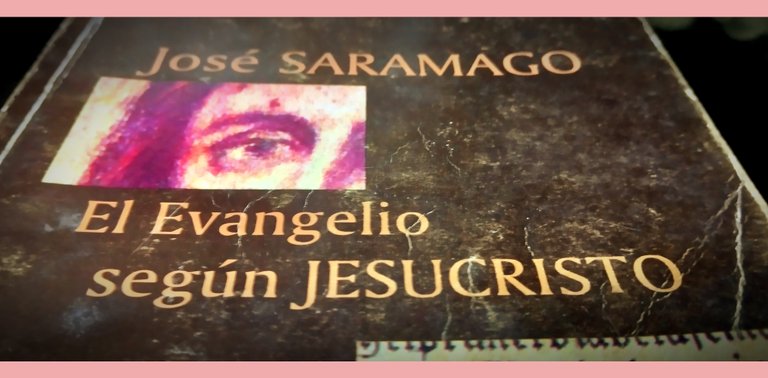
Today, I return to this corner for lovers of the written page to talk about one of those books that strike the soul with the force of a hammer. I’m referring to The Gospel According to Jesus Christ, the novel José Saramago wrote in 1991, one of those literary events that shook the world like an earthquake, the kind that doesn’t just challenge what you believe, but how you believe it.
I’m not exaggerating when I say this novel left me trembling. It was a brutal confrontation with the Catholic upbringing I once had and, at the same time, a humanizing journey toward the divine. This review may be far from objective and closer to a testimony of how a masterpiece can tear you in two and stitch you back together, never the same again.
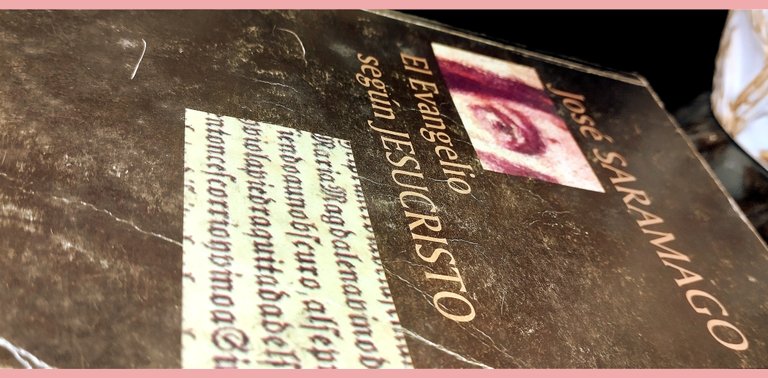
Saramago didn’t just write a book; he crafted an act of necessary heresy in the context of 1991, when the Vatican still held ironclad power over Western morality. This gospel arrived like a missile against dogma, written by a genius with that unmistakable style of endless sentences, no paragraph breaks, trapping you in a collective stream of consciousness, like when Jesus dreams of fishing boats and the prose becomes truly hypnotic.
Here, there is no Son of God, but a man of flesh and blood, with desires, fears, and mistakes. His relationship with Mary Magdalene, portrayed with revolutionary tenderness, shows us an erotic and earthly Christianity never before depicted.
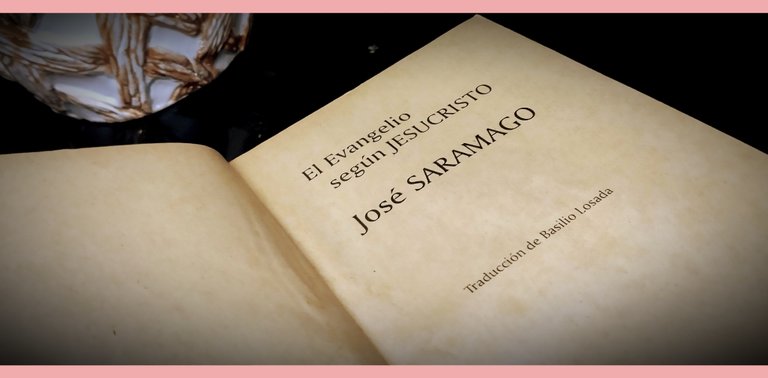
There’s a clear subversion of symbols: the devil, here called the Shepherd, is the most lucid character, almost a tragic hero, and the crucifixion is not redemption but a macabre theater. Here, Saramago denounces how religion serves power, and of course, Portugal, a deeply Catholic country, received the book with outrage. The government vetoed it for the European Literary Prize, leading Saramago to exile himself in Lanzarote.
The lesson of this book is that true literature, more than respectful, must be courageous. Saramago paid the price but won the battle, and today, The Gospel According to Jesus Christ is an undisputed classic.
Saramago left signs within his novel, almost like precepts I could never have imagined before: that doubt is more sacred than faith, that asking why may be the most spiritual act, or that God doesn’t have a monopoly on goodness and that even humor can be a weapon, even within faith.
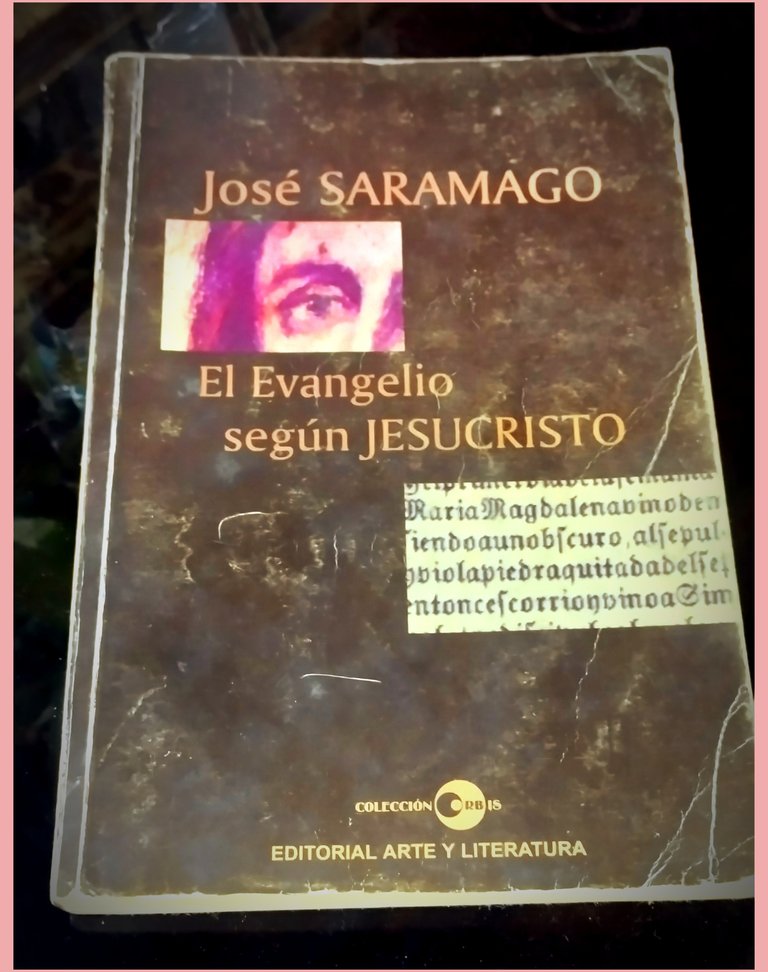
Let it be clear: this novel is far from blasphemy; it is, rather, an invitation to think. Do you know what it’s like to finish this novel feeling like both a traitor and a liberated soul? Saramago doesn’t destroy faith, he makes it grow, not upward, but inward.
This book doesn’t give answers; it leaves behind questions that still burn today. It teaches that literature is not meant to console but to awaken, and that Christ, as a symbol, is more powerful when human than when dogmatic.
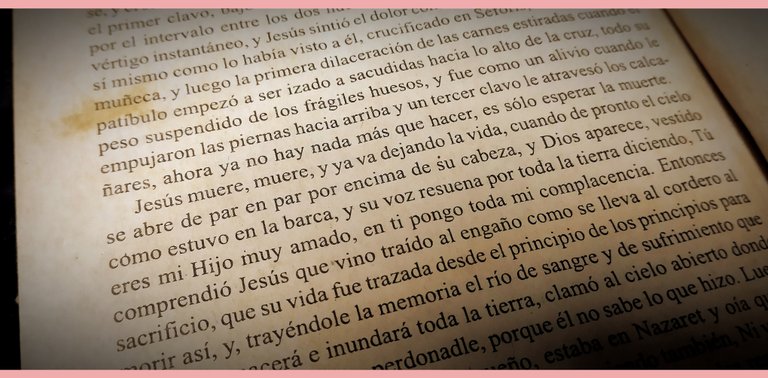
I want to end this review with the most striking words, those Jesus shouts on the cross: "Man, forgive them, for they know not what they do!"
Saramago forces us to know, and that may be his miracle. So if you decide to read this book, you can do so without fear, but be warned: you won’t emerge unscathed.
See you soon, friends of #hivebookclub, in this corner full of book lovers.
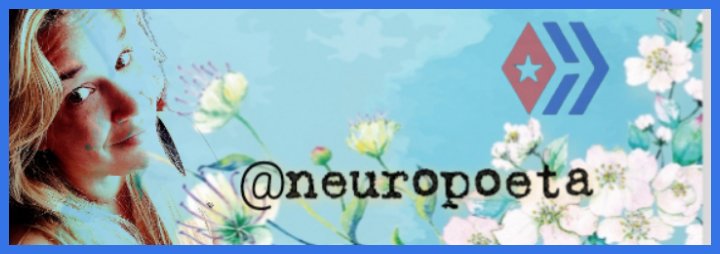
✨ 𝑻𝒉𝒂𝒏𝒌𝒔 𝒇𝒐𝒓 𝒓𝒆𝒂𝒅𝒊𝒏𝒈! ✨
𝑰𝒇 𝒚𝒐𝒖 𝒅𝒐𝒏’𝒕 𝒌𝒏𝒐𝒘 𝒎𝒆 𝒚𝒆𝒕—𝑰’𝒎 𝒂 𝑪𝒖𝒃𝒂𝒏 𝒏𝒆𝒖𝒓𝒐𝒍𝒐𝒈𝒊𝒔𝒕 𝒂𝒏𝒅 𝒘𝒓𝒊𝒕𝒆𝒓, 𝒂 𝒎𝒐𝒕𝒉𝒆𝒓, 𝒂 𝒘𝒐𝒎𝒂𝒏, 𝒂𝒏𝒅 𝒂 𝒅𝒓𝒆𝒂𝒎𝒆𝒓 𝒘𝒉𝒐’𝒔 𝒇𝒐𝒖𝒏𝒅 𝒊𝒏 𝑯𝒊𝒗𝒆 𝒂 𝒃𝒆𝒂𝒖𝒕𝒊𝒇𝒖𝒍 𝒔𝒑𝒂𝒄𝒆 𝒕𝒐 𝒔𝒐𝒂𝒓.
𝑨𝒍𝒍 𝒕𝒆𝒙𝒕 𝒂𝒏𝒅 𝒊𝒎𝒂𝒈𝒆𝒔 𝒂𝒓𝒆 𝒎𝒚 𝒐𝒓𝒊𝒈𝒊𝒏𝒂𝒍 𝒄𝒓𝒆𝒂𝒕𝒊𝒐𝒏𝒔, 100% 𝒉𝒖𝒎𝒂𝒏-𝒎𝒂𝒅𝒆 (𝒏𝒐 𝑨𝑰).
𝑩𝒂𝒏𝒏𝒆𝒓 𝒅𝒆𝒔𝒊𝒈𝒏𝒆𝒅 𝒃𝒚 𝑳𝒖𝒎𝒊𝒊.
𝑳𝒐𝒗𝒆𝒅 𝒕𝒉𝒊𝒔 𝒑𝒐𝒔𝒕? 𝑼𝒑𝒗𝒐𝒕𝒆, 𝒄𝒐𝒎𝒎𝒆𝒏𝒕, 𝒐𝒓 𝒓𝒆𝒃𝒍𝒐𝒈 𝒕𝒐 𝒔𝒑𝒓𝒆𝒂𝒅 𝒕𝒉𝒆 𝒘𝒊𝒏𝒈𝒔 𝒐𝒇 𝒄𝒓𝒆𝒂𝒕𝒊𝒗𝒊𝒕𝒚! 💛

VERSIÓN EN ESPAÑOL

El evangelio según Saramago: Una herejía necesaria que sacude el alma || Reseña

Hoy regreso a este rincón de amantes de las páginas para hablar de uno de esos libros que golpean el alma con la fuerza de un martillo. Les comento acerca de El evangelio según Jesucristo, la novela que José Saramago escribió en 1991, uno de los acontecimientos literarios que funcionaron como verdaderos terremotos, de esos que no solo cuestionan lo que crees, sino cómo lo crees.
No exagero al decir que esta novela me dejó temblando, pues fue una confrontación brutal con la educación católica que en algún momento pude tener y, al mismo tiempo, un viaje humanizador hacia lo divino. Esta reseña quizás esté lejos de ser objetiva y más cerca de ser un testimonio de cómo una obra maestra puede rasgarte en dos y volverte a coser, ya nunca igual.

Saramago no escribió un libro, sino un acto de herejía necesaria, en el contexto de 1991, cuando el Vaticano aún ejercía un poder férreo sobre la moral occidental. Entonces llega este evangelio como un misil contra el dogma, escrito por un genio con ese estilo inconfundible de frases larguísimas, sin puntos aparte, que te atrapan en un flujo de conciencia colectivo, como cuando Jesús sueña con los barcos de pescadores y la prosa se vuelve realmente hipnótica.
Aquí no hay hijo de Dios, sino un hombre de carne y hueso, con deseos, miedo y errores. Su relación con María Magdalena, tratada con una ternura revolucionaria, nos muestra un cristianismo erótico y terrenal que nunca se había retratado.

Existe una clara subversión de símbolos donde el diablo, aquí llamado Pastor, es el personaje más lúcido, casi un héroe trágico, y la crucifixión no es redención, sino un teatro macabro. Aquí Saramago denuncia cómo la religión sirve al poder, y claro, Portugal, que es un país de arraigado catolicismo, recibió el libro con indignación. El gobierno lo vetó para el Premio Literario Europeo, por lo que Saramago se exilió en Lanzarote.
Queda la enseñanza con este volumen: que la literatura verdadera, más que respetuosa, debe ser valiente, y Saramago pagó el precio pero ganó la batalla. Hoy, El evangelio según Jesucristo es un clásico indiscutible.
Saramago me dejó señales dentro de su novela, algo así como preceptos que antes no podía imaginar: que la duda es más sagrada que la fe, que preguntar un por qué puede ser el acto más espiritual, o que Dios no tiene monopolio sobre el bien y que incluso el humor puede ser un arma, incluso desde la fe.

Que quede claro que esta novela está lejos de ser una blasfemia; es, más bien, una invitación a pensar. ¿Saben lo que es terminar esta novela sintiéndose traidor y liberado al mismo tiempo? Saramago no destruye la fe, la hace crecer, pero ya no hacia arriba, sino hacia adentro.
Este libro no da respuestas, deja preguntas que aún hoy queman. Enseña que la literatura no es para consolar, sino para despertar, y que Cristo, como símbolo, es más poderoso cuando es humano que cuando es dogma.

Quiero concluir esta reseña con las palabras que más marcan, aquellas que Jesús grita en la cruz: "¡Hombre, perdónalos, porque no saben lo que hacen!"
Saramago nos obliga a saber, y ese quizás sea su milagro. Así que, si decides leer este libro, puedes hacerlo sin miedo, pero vale la aclaración: no saldrás indemne.
Nos veremos dentro de poco, amigos de #hivebookclub, por este rincón lleno de amantes de los libros.

✨ ¡𝑮𝒓𝒂𝒄𝒊𝒂𝒔 𝒑𝒐𝒓 𝒍𝒆𝒆𝒓! ✨
𝑺𝒊 𝒂ú𝒏 𝒏𝒐 𝒎𝒆 𝒄𝒐𝒏𝒐𝒄𝒆𝒔: 𝒔𝒐𝒚 𝒏𝒆𝒖𝒓ó𝒍𝒐𝒈𝒂 𝒚 𝒆𝒔𝒄𝒓𝒊𝒕𝒐𝒓𝒂 𝒄𝒖𝒃𝒂𝒏𝒂, 𝒎𝒂𝒅𝒓𝒆, 𝒎𝒖𝒋𝒆𝒓 𝒚 𝒔𝒐ñ𝒂𝒅𝒐𝒓𝒂 𝒒𝒖𝒆 𝒆𝒏𝒄𝒐𝒏𝒕𝒓ó 𝒆𝒏 𝑯𝒊𝒗𝒆 𝒖𝒏 𝒉𝒆𝒓𝒎𝒐𝒔𝒐 𝒆𝒔𝒑𝒂𝒄𝒊𝒐 𝒑𝒂𝒓𝒂 𝒗𝒐𝒍𝒂𝒓.
𝑬𝒍 𝒕𝒆𝒙𝒕𝒐 𝒚 𝒍𝒂𝒔 𝒊𝒎á𝒈𝒆𝒏𝒆𝒔 𝒔𝒐𝒏 𝒅𝒆 𝒎𝒊 𝒂𝒖𝒕𝒐𝒓í𝒂, 100% 𝒉𝒖𝒎𝒂𝒏𝒐𝒔 (𝒔𝒊𝒏 𝑰𝑨).
𝑩𝒂𝒏𝒏𝒆𝒓 𝒅𝒊𝒔𝒆ñ𝒂𝒅𝒐 𝒑𝒐𝒓 𝑳𝒖𝒎𝒊𝒊.
¿𝑻𝒆 𝒈𝒖𝒔𝒕ó 𝒆𝒔𝒕𝒂 𝒑𝒖𝒃𝒍𝒊𝒄𝒂𝒄𝒊ó𝒏? 𝑽𝒐𝒕𝒂, 𝒄𝒐𝒎𝒆𝒏𝒕𝒂 𝒐 𝒓𝒆𝒃𝒍𝒐𝒈𝒖𝒆𝒂 𝒑𝒂𝒓𝒂 𝒂𝒚𝒖𝒅𝒂𝒓 𝒂 𝒅𝒆𝒔𝒑𝒍𝒆𝒈𝒂𝒓 𝒆𝒔𝒕𝒂𝒔 𝒂𝒍𝒂𝒔. 💛
I know I would want to read this book here. I'm so certain.
I recently started reading bible novels that comes in other ways like a back version of the stories.
It makes me think deeply about what must have happened in those periods
Never hesitate to read this book, because besides providing a biblical version, it is a monumental work by one of the greatest writers we have had the pleasure of enjoying
You received an upvote ecency
Thanks for the support 🌻🤗🤭
God word has always will be magic to read and know❤️
Always🙏🏻
De Saramago ya he leído unos libros, me falta este, espero leerlo en el futuro.